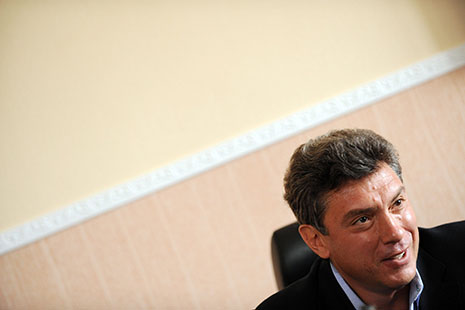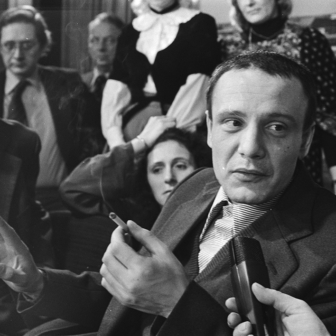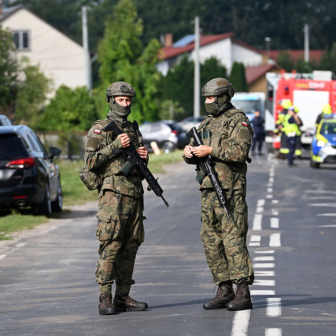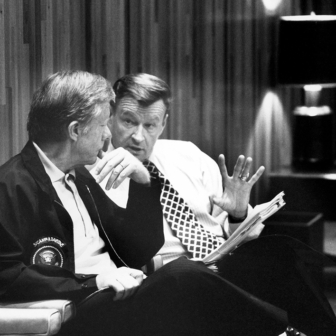IT IS DIFFICULT to imagine a less likely firebrand than Dr Evgenii Gontmakher, the mild-mannered head of a social policy research centre in the Russian Academy of Sciences. Even one of the Putin regime’s most militant defenders has described him as “unimpeachably loyal.” But last November, Gontmakher ignited a political firestorm by publishing an article titled “Novocherkassk 2009” in Vedomosti, a leading Russian business newspaper affiliated with the Financial Times. His title alluded to a notorious Soviet-era massacre of workers protesting in 1962 against rises in food prices and work norms in the town of Novocherkassk. Gontmakher set out to explain, in fourteen steps, how a similar social explosion could erupt today in “N-sk,” one of 700 Russian “mono-towns” whose economic life revolves around a single industrial employer.
In Gontmakher’s narrative, the crisis in N-sk is triggered by the decision of the employer to begin mass layoffs in a bid to avert bankruptcy. The social impact of this step is magnified by the fact that the corrupt local bureaucracy has stifled small business, so there are few alternative sources of employment. The city administration, paralysed by its dependence on orders from Moscow, flees its offices when faced by mass protests. When the local police fail to intervene against their fellow townsfolk, the demonstrators occupy administrative buildings and begin to create their own alternative power structures. The collapse of local authority is completed by the resignation of the regional governor. By the time the Kremlin has finally taken action to restore order by offering credit to the bankrupt employer, a similar chain reaction has started in “town M-sk.”
The fact that Gontmakher’s scenario became a political sensation was partly a result of the kind of bureaucratic ineptitude that he portrayed. A senior official of the government department responsible for overseeing mass communications sent a warning letter to Vedomosti, claiming that the article could incite “extremism.” In Putin’s Russia, this nebulous term is one of the markers of the limits of the permissible, and in theory the very existence of the newspaper was under threat. Legislation passed in 2006 outlaws incitement to extremist activity and public statements that excuse such activity. Although ostensibly directed against Islamist terrorism and skinhead violence, the anti-extremism legislation has been repeatedly invoked by the security organs in their campaign against the mainstream political opposition. Its application to Gontmakher seemed to mark a new stage in the suffocation of public debate. As the journalist Yuliya Latynina remarked, “If Gontmakher, a highly scholarly man, can really be equated with Bin Laden, I certainly do not know who can consider himself safe in our country.”
What makes the vilification of Gontmakher particularly ironic is the fact that officials from Putin’s office contacted this “extremist” to thank him for a “timely warning” that would be incorporated into the government’s crisis-management strategy. The lessons they learned may have been reflected in a decision, several weeks later, to send units of Interior Ministry troops from Moscow across six time zones to suppress protests in Vladivostok, where, as in Gontmakher’s “N-sk,” local forces could not be trusted.
The controversy surrounding Gontmakher reflects the ambivalence of his analysis. If he offers useful tools to Putin’s crisis managers, he has also become emblematic of an increasingly vocal faction within the Russian elite which is questioning the basic tenets of the authoritarian, corporatist state that emerged under Putin. One of the bastions of this tendency is the Institute for Contemporary Development, a think tank linked both to the presidential administration and to powerful business circles. It was launched in March 2008 by President Medvedev, who heads its board of trustees. Its director, Igor Yurgens, is the vice-president of Russia’s pre-eminent business lobbying association, the Union of Industrialists and Entrepreneurs.
In February this year, Yurgens used the occasion of the launching of a report on anti-crisis measures to propound a subversive thesis about the necessity of democratisation. He argued that in the years after Putin’s accession to the presidency “the social contract consisted of limiting of civil rights in exchange for economic well-being. At the current moment, economic well-being is shrinking. Correspondingly, civil rights should expand. It’s just simple logic.”
Yurgens’ “simple logic” is vehemently rejected by the architects of Russia’s “managed democracy.” The most strident is Vladislav Surkov, the Kremlin’s deputy chief of staff, who is widely regarded as the regime’s unofficial ideologist. During Putin’s second term, Surkov supervised the creation of the pro-regime youth movement “Nashi” and popularised the term “sovereign democracy” to legitimise uncompetitive elections and controls over non-government organisations. On 3 March, Surkov lashed out at the advocates of democratic reform in a speech to a conference marking a milestone in the history of “sovereign democracy”: the first anniversary of Dmitrii Medvedev’s victory in tightly controlled presidential elections. “Of course,” he declared, “this model will survive the crisis.” To justify his confidence, he extolled the advantages of strong government over the chaotic pluralism of the 1990s, when economic troubles inevitably precipitated the fall of governments. Mocking the pretensions of Russian liberals as “free people,” he contended that, if realised, their dream of liberalisation would lead only to the extinction of the remnants of liberty in Russia and the establishment of a durable dictatorship. “With all due respect for free people,” he sneered, “those free people would have stirred up so much trouble here that, afterward, someone who does not love freedom would have come along and introduced order for another 100 years.”
Surkov’s defence of the Putin model came the day after a more sinister attack on the liberals by Gleb Pavlovskii, a former dissident who is the Kremlin’s leading spin-doctor. In an interview with the pro-government newspaper Komsomolskaya Pravda, Pavlovskii argued that the real threat to the regime came not from the streets but from the enemy within, a “pro-crisis party” in state institutions who want to trigger “a little new coup,” a “farcical remake” of the failed putsch of August 1991 or Ukraine’s Orange Revolution. According to Pavlovskii, this “party” was numerically small, but it included “people at the pinnacle of the federal authorities, big business, circles in the capital, [and] some of the [regional] governors.” If the regime faltered, these turncoats would come into the open and attempt to instigate mass protests and assume the mantle of revolutionaries.
WHAT THE PUTIN REGIME’s apologists can no longer deny is the fact that the Russian economy is reeling from the double impact of plummeting oil prices and the credit crunch. Russia’s much vaunted gold and foreign currency reserves, the third-largest in the world before the crisis, may be exhausted by the end of this year. During the second half of 2008, the Russian stock market lost over 70 per cent of its value. Even Oleg Deripaska, Russia’s richest man and Putin’s favourite oligarch, has fallen on hard times. According to some estimates, his wealth contracted by 85 per cent; only a state bailout saved him from defaulting on loans to Western banks. Meanwhile ordinary Russians face rising unemployment and soaring underemployment. As demand collapses, factories are idling and many enterprises have reduced their workforce to a two or three day week.
The contribution of the Russian government to this escalating internal crisis is now a focus of bitter debate. At every opportunity, Putin and his entourage lambast the incompetence of the US government and the recklessness of Wall Street. For them, Russia is an innocent victim of an American contagion.
No one in the liberal opposition denies that the origins of the current crisis are to be found across the Atlantic, but there is now a chorus of voices drawing attention to the ways that Russia’s economic malaise has been aggravated by the actions of its own government. The most outspoken are Boris Nemtsov, a former vice-premier, and Vladimir Milov, a former energy minister, who marked the end of Putin’s presidency with a major critical study of his economic record. In early March, they updated their project with a new report on the response of the Putin–Medvedev “tandemocracy” to the global economic crisis. They showed how the regime believed its own self-congratulatory propaganda about Russia’s special position as an “island of stability” in the global financial storm. As late as October, Putin was still insisting that “we have complications but no crisis.”
The result of this self-delusion was a sequence of catastrophic blunders. First, Putin’s government squandered a third of its hard currency reserves, over $200 billion, in a futile defence of the rouble, whose devaluation was inevitable because of the collapse of energy prices. Second, it provided the banking sector with a massive injection of roubles, which were promptly spent on hard currency, increasing the pressure on the Russian currency. Third, capital flight was aggravated by Putin’s latest round of intimidation directed at business leaders, which began in July with his mafiosi-like suggestion that “we send a doctor” to Igor Zyuzin, the director of the coal-mining conglomerate Mechel, who had failed on health grounds to attend a discussion of allegations that he was charging excessive prices to local industry. The ensuing collapse of Mechel’s share price triggered a crisis of business confidence and a rapid outflow of capital to the West. This surge became a torrent in the aftermath of Russia’s invasion of Georgia and its aggressive anti-Western posturing on the stage. At this point, Putin presided over a debacle that Nemtsov and Milov hailed as the “apotheosis of government’s incompetence,” the November budget, which was based upon utterly unrealistic estimates for inflation, the exchange rate, GDP growth and oil prices. The Russian state was left without a viable budget for the first time since the disintegration of the Soviet Union.
In their conclusions, Nemtsov and Milov threw down the gauntlet to the apologists for dictatorship. They argued that the closed, authoritarian, corrupted model of the state created by Putin has demonstrated its ineffectiveness in dealing with the challenges of the global economic crisis. Therefore, “the dismantling of Putinism and the restoration of democracy is the most important instrument of anti-crisis action.” This dismantling, they insist, “should begin with the resignation of the government of Vladimir Putin.”
But dismantling an authoritarian state is easier said than done. Dmitrii Medvedev’s accession to the presidency inspired many with hopes of a political thaw, a gradual opening up of the political system. Medvedev’s liberal instincts are suggested by his repeated criticism of “legal nihilism” and his connections with institutional critics of Putinism like Gontmakher and Yurgens. His meeting with the editor of the opposition newspaper Novaya Gazeta after the murder of the journalist Anastasia Baburova contrasted spectacularly with Putin’s spiteful reaction two years earlier to the murder of her co-worker, Anna Politkovskaya.
But Putin remains Russia’s dominant politician. As premier, he supervises the daily work of government. As the head of United Russia, the “party of power,” he sits at the centre of a network of bureaucratic influence that extends across the country. As a former KGB agent, he is the pre-eminent representative of the siloviki, the security officials whom he ushered into the upper echelons of government. Informally, he enjoys a symbolic status as “leader of the nation,” a designation that was coined by United Russia officials as part of an abortive proposal for the perpetuation of his pre-eminence after his departure from the presidency.
Certainly no challenge to Putin is likely to originate in the parliament, the State Duma, which is little more than a rubber stamp for his whims. The Duma’s ethos was summed up by its speaker, former interior minister Boris Gryzlov, who boasted in 2004 that it is “not a place for debate.” The illusion of a multiparty system is sustained only by the continuing existence of the Communist Party, an ossified totalitarian relic in terminal decline. The other ostensibly left-wing party, “A Just Russia,” is a fabrication of Kremlin “political-technologists.” A tame liberal counterpart, “Right Cause,” was unveiled last November after the dissolution of one of the remaining liberal parties, the Union of Right Forces.
Nor are there any signs that the mainstream media will repeat the experience of their Soviet-era predecessors as flagships of reform during Gorbachev’s perestroika. Whilst vigorous debate and honest reporting can be found on the radio station Ekho Moskvy and in the pages of three newspapers, the major television networks adhere closely to government guidelines for political coverage. A host of opposition leaders and prominent commentators have been placed on “Stop Lists,” which effectively ban their appearance on national television. In one notorious incident, the economist Mikhail Delyagin was filmed as a member of a discussion panel on a current affairs show, and had to be digitally erased during the production process. All that remained of his participation were his legs.
BUT BEYOND the carefully policed borders of Russia’s public sphere there are signs of ferment. The leaders of the democratic movement, long divided by personal rivalries and backroom deals with the Kremlin, have at last begun to rally around a common program. Despite a massive campaign of harassment, a new democratic movement, named Solidarnost (“Solidarity”) after its Polish predecessor, held its founding congress on the outskirts of Moscow on 12 December last year, the anniversary of the adoption of the Yeltsin constitution. Its leadership council unites many of the most charismatic and effective opposition activists: Boris Nemtsov, Vladimir Milov, Garry Kasparov, Lev Ponomaryov and Ilya Yashin. Solidarnost’s programme, “300 Steps to Freedom,” is the most elaborate statement of democratic demands in over a decade.
Now Solidarnost is testing the limits of Russia’s “managed democracy.” Exploiting the fact that mayoral elections are not yet subject to the controls that have stifled competition in national elections, Nemtsov is running as a candidate for mayor of Sochi, a city on the Black Sea coast with a population of 400,000. Widely regarded as Russia’s summer capital, Sochi is a favourite site for high-level meetings, and a playground of the Russian elite. For the Kremlin, Sochi has immense symbolic importance because it is due to host the Winter Olympics in 2014, one of Putin’s pet projects.
For many observers, the fact that Nemtsov was even registered as a candidate represented a minor miracle. Both the security forces and the pro-regime youth movement “Nashi” appear to have fixed him in their sights. Two attackers, including a man dressed as a woman who was later exposed as a “Nashi” activist, sprayed a cocktail of Coca-Cola and ammonia into Nemtsov’s face. Then, $US5000 was paid into his bank account by a Russian emigrant in New York in an apparent effort to put him in violation of regulations outlawing foreign funding of political campaigns. Whilst these efforts failed to derail Nemtsov’s registration, official pressure shows no signs of abating. The police have confiscated truckloads of his election leaflets and the local media are conducting what his campaign manager, Ilya Yashin, calls an “information war.”
The Sochi poll, due on 26 April, has become a microcosm of the struggle over Russia’s future. The authorities’ fear of Nemtsov’s bold campaign – which threatens to force its candidate into a second round of voting – refutes the claims of many Western commentators that Russia’s democratic movement is a spent force. Undeterred by dirty tricks, street thuggery, public vilification, and the likelihood of major electoral fraud, Solidarnost has begun to illuminate not merely the brutality but also the incompetence of Putinism. For the first time in a decade, Russian democrats have reason to hope. •




